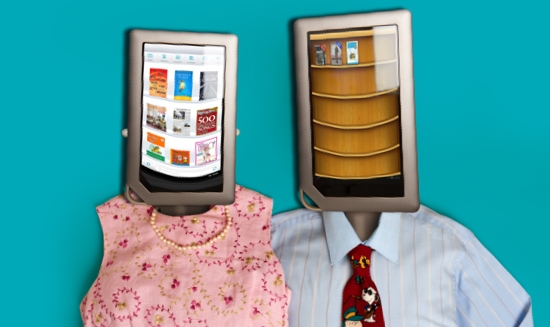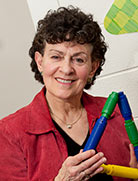
By Roberta Golinkoff


Welcome to parenting in the 21st century! Everyone we know owns an iPod, watches podcasts, reads blogs and can’t wait to get an iPad or high-definition TV. So it makes sense that the technological wonders that we experience as adults should surely catapult our children to successful positions in today’s global world. Press a button and an electronic book will read you a story. Special DVDs flash pictures of animals unobstructed by the bars children might see at the zoo. New television stations offer specialized programming for even our babies around the clock.
As Americans, we are quick to adopt technology as a symbol of progress. But is this technology good for America’s youngest children? Are all the DVDs sold for babies really enhancing their thinking skills? Are children from zero to three really better off hearing a story from an electronic book rather than cuddling up on Dad’s lap with their favorite book?
For technology-minded parents, electronic books seem ideal. If a book can be delivered electronically instead of through a parent’s voice, that must mean that it offers something to children that plain old parental storybook reading cannot. If a DVD can offer learning opportunities that don’t require parental involvement and keep children happy at the same time, this must be good for kids.
The American Pediatric Association has told us their opinion on television and video watching for our youngest children: They say don’t do it. And the Kaiser Family Foundation, in a 2005 report, thinks that techno-toys have been overhyped with little research to back up the claims on the boxes.
Recent findings from our laboratories bear this out. When parents and their 3-year-olds spend time reading an electronic book together, parents spend much of the time trying to control their child’s manipulation of the book rather than talking about the story.
With electronic books, 41 percent of the parent’s talk is about managing the child’s book behavior, and only 59 percent is about the story itself. With old-fashioned traditional books, the interaction focuses on the narrative with 92 percent of the parent’s talk about things related to the story.
Years of research in literacy has taught us that one of the best predictors of reading success are those conversations parents and children have around traditional storybooks where the sound effects are produced by the parent’s mouth — the old-fashioned way. Reminding Junior about how that mangy dog resembles the one Nana has, or asking for a count of the sleepy sheep, makes storybook reading come alive. Children pick up new vocabulary without even trying as parents talk about what the child’s little pointing finger indicates. With traditional books, children are not preoccupied with the bells and whistles but with following the story’s narrative, a skill that will be crucial for learning to read and loving reading.
Techno-toys have been oversold and are underperforming. Our youngest children are losing out on parental interaction just when they need it most. Young children need their parents, not fancy gadgets and gizmos, to follow up on children’s questions and talk about that tree with the red berries that they see their child staring at out the window.
When we buy the techno-toys that appear to herald our new age, we are going against our intuition and our memories of what mattered most to us when we were kids. Imagining a new world, taking a trip in a cardboard box and playing tea party with our friends built our creativity and prepared us for school.
When we buy techno-toys, we succumb to the hype on the outside of the box and to the anxiety these toys evoke in us. This toy will make your child smarter and learn his ABCs (he’s only 10 months old); that videotape will build the left side of her brain, offering her the riches of another language. All parents are eager to help their children grow and learn; the irony is that these expenditures will not pay off. Techno-parenting is no advance, but in fact, a retreat to the days when children were seen but not heard, to the days when children were discouraged from asking questions and told to be good. Techno-parenting removes the parent from parenting.
The science of child development tells us that parents are their children’s most effective teachers. Answering our children’s childish questions about characters in the story (“Why da boy cry?”), taking them to a real zoo rather than showing them a video, playing with them on the floor under a blanket, all provide the fodder for your child’s natural, amazing development.
Think retro when you think toys. Remember the toys you enjoyed most, and you will have the secret of child development — and more change in your pocket. Play-Doh, crayons and markers, building blocks, costumes and funny hats — these are the toys that offer endless possibilities and allow children to create and achieve. This won’t happen through techno-toys that either require the child to sit still and watch, or find that one right answer the electronic toy barks for. And you are your child’s biggest gift.
Kids learn from their parents — especially when we capitalize on those “teachable moments” that present themselves during an ordinary day. Techno-parenting reduces the opportunities that parents have to offer those tidbits that play right into their child’s current interests. Until techno-parenting devices have hearts that beat and can offer loving and playful guidance, and until they are made with visual and auditory systems that can sense what children want to know and build on that, there is no substitute for mommy, daddy or grandma.
Roberta Michnick Golinkoff holds the H. Rodney Sharp Chair in the School of Education at UD. The author of 12 books and numerous professional articles, Golinkoff founded and directs the Infant Language Project, which seeks to understand how children tackle the amazing feat of learning language. She is the recipient of the prestigious John Simon Guggenheim Fellowship, the James McKeen Cattell Sabbatical Award and the University’s highest faculty honor — the Francis Alison Award. Frequently quoted in the print and broadcast media. Golinkoff speaks at conferences around the world about children’s development.